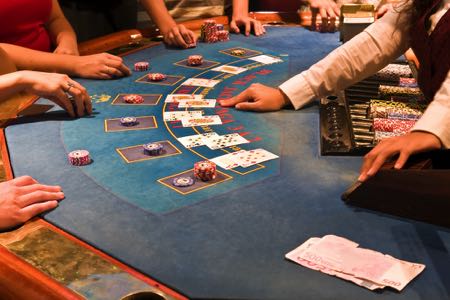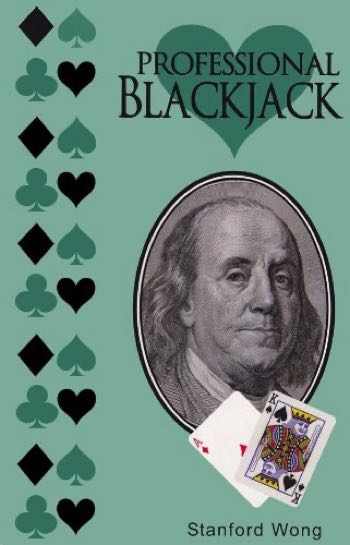 If you were chatting to someone and they told you that they’d got their Wong out when playing blackjack then you might well imagine that they’d been subsequently thrown out by the casino in which they were playing. In actual fact, what they are probably telling you is that they pulled off a card-counting technique that was named in honour of Stanford Wong. The pen name of the man who wrote Professional Blackjack and other gambling books, Stanford Wong didn’t invent it but he and his students did popularise it.
If you were chatting to someone and they told you that they’d got their Wong out when playing blackjack then you might well imagine that they’d been subsequently thrown out by the casino in which they were playing. In actual fact, what they are probably telling you is that they pulled off a card-counting technique that was named in honour of Stanford Wong. The pen name of the man who wrote Professional Blackjack and other gambling books, Stanford Wong didn’t invent it but he and his students did popularise it.
In essence, Wonging involves standing behind a table on which blackjack is being played and counting the cards, noting the moment that they have turned in the player’s favour and taking a seat at that point. Sometimes called ‘back-counting’, it is commonly used when there are several decks in play because that gives the Wonger time to do the counting. When only a couple of decks are being used, it is much more difficult to get a sense of where the cards are up to before the decks are taken in by the dealer and shuffled.
Who Was Stanford Wong?
John Ferguson was born in 1943 and in 1975 he published a book entitled Professional Blackjack. He had begun playing the game in earnest 11 years earlier, taking part in it whilst simultaneously teaching finance at San Francisco University and earning his Ph.D in Finance at Stamford University. He enjoyed gambling far more than he did teaching, so struck an agreement with San Francisco University to be paid $1 for his final term of teaching on the condition that he wouldn’t need to attend any faculty meetings.
A Pen Name
He originally wanted to take the pen name Nevada Smith, but when he discovered that that had already been taken he spoke with a friend in his Ph.D program who suggested Stanford Wong. The idea was that the first name would come from his alma mater, and the second would offer the ‘mystique of the Orient’. Having been obsessed with strategy ever since he played Tic-Tac-Toe in kindergarten, Ferguson was a competitive person and wanted to find ways to beat others whenever he took part in any sort of game with an element of competitiveness involved.
Early Blackjack Career
Though Ferguson’s professional blackjack career got underway in 1964, almost the moment he turned 21, he had been perfecting his strategy since he first played it as a 12-year-old. Knowing that he wasn’t old enough to play in a casino, he consumed every book that he could on the subject of gambling, with Edward O. Thorp’s Beat the Dealer being particularly influential. At school he excelled, earning a scholarship to attend Oregon State University but counting down the days until he’d be old enough to enter a casino and put his strategy into practice.
Vietnam War
With a bankroll of $300, Ferguson used Thorp’s 10-count system to earn $150 pretty quickly with stakes of between $1 and $4. He continued to gamble in the years that followed, then in 1968 he was drafted into the army for the Vietnam War. He underwent eye-opening experiences in Vietnam, turning to blackjack as a distraction once he returned, with a story suggesting that he won more than $100,000 over his first couple of months back in the United States of America. It was at this point that he started writing his first book…
Professional Blackjack
Professional Blackjack was published in 1975 and was more than 350 pages in length, revealing many of the secrets that he had discovered during his time playing the game. There were in excess of 100 supplementary tables, outlining exactly how players should approach various scenarios when playing blackjack. Perhaps the most important and influential thing that he wrote about in the book, though, was the technique that became known to many as ‘Wonging’. This focussed on players making fewer bets but spending more time calculating odds and watching the other players on the table.
Wonging Explained
 In its most simplistic terms, Wonging is a form of card counting. The first thing that you need to know about this method of card counting is that it is done from behind the table and the players on it, as opposed to whilst being sat and playing yourself. Also known as ‘back-counting’ for this very reason, those that are Wonging will watch a table and keep a track of the cards, waiting for the moment that the deck shifts to the point that it is +2 or greater in card-counting terms. Particularly skilled counters can track several tables at the same time, often using the mirrors in casinos to do so.
In its most simplistic terms, Wonging is a form of card counting. The first thing that you need to know about this method of card counting is that it is done from behind the table and the players on it, as opposed to whilst being sat and playing yourself. Also known as ‘back-counting’ for this very reason, those that are Wonging will watch a table and keep a track of the cards, waiting for the moment that the deck shifts to the point that it is +2 or greater in card-counting terms. Particularly skilled counters can track several tables at the same time, often using the mirrors in casinos to do so.
From the moment that the deck becomes favourable to the players, Wongers, as the practitioners of Wonging are known, will enter play and keep playing until either the conditions switch and become unfavourable or else until the deck is shuffled. Where Wonging differs from other styles of card counting is in the fact that those practicing it don’t need to sit through the moments where the count is unfavourable, losing small stakes until the count shifts in their favour. Those that do this are often resentful to Wongers as they feel as though they haven’t ‘earned’ the right to enjoy the favourable cards.
What Is Semi-Wonging?
Wonging is clear enough, then, but what of Semi-Wonging? In essence, this is where a player exits a game at the point at which it has reached a pre-determined point, looking for another game instead. This exit point is a matter of personal opinion, though many feel that the moment that the game is at a count of 0 or less is the right point to leave. If you’re sticking with a game until it hits 0 or lower, you’ll have not taken part in around a third of negative expectation hands, avoiding the ‘play-all’ approach that other card counters take.
When card counting, people attend a value to each card. Low cards increase the count whilst high cards decrease it, with 7s, 8s and 9s tending to count as zero because they don’t really affect the count. These are the things that Wongers and those engaged in Semi-Wonging will track as they look at a deck, noting which cards are worth what and figuring out the moment at which it is best for them to either enter a game or to leave it. Getting these moments right can be key for Wongers and Semi-Wongers.
Is It Legal?

The most important thing to note is that card counting is not illegal in the United Kingdom, nor is it illegal in the United States of America provided there is no external card counting machine or device used for the counting. Just because something isn’t illegal doesn’t mean that casinos welcome the practice, of course. In Atlantic City, casinos are not allowed to ban card counters thanks to a ruling by the New Jersey Supreme Court. Instead, the casinos in the city employ various counter-measures against the practice.
There are numerous different counter-measures that casinos can use against card counters in places where it is technically legal for people to do it. The first is increasing the number of shuffles, though this takes time and therefore costs money, stopping hands from being dealt and the House Edge from operating. Some casinos ban players from entering a game between shuffles, whilst others do not allow punters to change their wager amount between shuffles, forcing them to stick with the same stakes.
Does It Still Work?
An entirely reasonable question to ask would be whether or not Wonging still works as a practice. The answer is a complicated one, not least because different casinos offer different forms of blackjack in the modern era. For his own part, Ferguson encourages those that wish to employ Wonging as a method to ensure that they don’t stay at one table for too long. Instead, he believes that you should only sit at a table when you’ve noticed that it has become advantageous for players and leave when it gets to the point that it is no longer so.
Ferguson’s Advice
Ferguson thinks that there is no need to play losing ‘waiting bets’ if you’re not going to play at an unprofitable table, though he also admits that sometimes you need to make such a sacrifice in order to avoid alerting the casino personnel to the fact that you’re card counting. Whilst it isn’t illegal, they don’t like it and will do what they can to discourage it, up to and including refusing to allow you to play games on their tables. He does, however, feel as though placing small bets and then big ones when the table is fruitful looks more suspicious than just walking away from the table altogether.
He also argues that playing uniform bets is better than constantly chopping and changing the size of your stake depending on the state of the table. The idea isn’t to play as many hands as possible, but rather to take part in hands when you think the table has turned in your favour. As always, of course, you are gambling and are just as likely to lose a bet as to win one. You might have got the count wrong, say, or not noticed that the deck has been shuffled. There are any number of things that could turn a table against you and cause you to lose your money.
The Disadvantages Involved in Wonging

As you might expect, it isn’t all sunshine and roses when it comes to Wonging. For starters, the practice is one that casinos are more than aware of. As a result, the chances of being exposed as a card counter when practicing Wonging are high. Equally, there is nothing to say how long a supposedly positive deck will last for. This means that a Wonger might think that they’re in a position to try to win something but, in actual fact, the deck has turned against them and they’re liable to lose the stake money that they’re betting with.
It is also not a practice that will work in online blackjack. A computerised version of the game will effectively shuffle the deck between each hand, whilst the cards also tend to be shuffled more regularly when you’re playing the game against live dealers. This doesn’t mean that you can’t practice Wonging when playing online, but the likelihood is that you’re not going to be able to use the method successfully on account of the fact that the cards are constantly being reset during your play. Wonging is a method of card counting, but it isn’t the only way to do it.